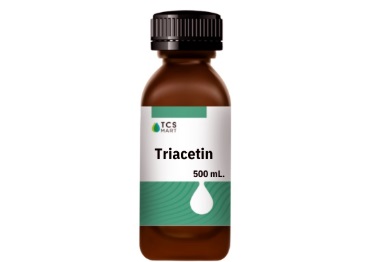Nikhil Prasad Fact checked by:Thailand Medical News Team Jan 16, 2025 2 months, 4 weeks, 4 hours, 8 minutes ago
Medical News: Allergic contact dermatitis (ACD) is a widespread skin condition affecting approximately 15 - 20% of the global population. This inflammatory disorder is triggered by allergens such as metals, fragrances, and preservatives. These allergens penetrate the skin, leading to redness, swelling, and itching that can severely impact an individual’s quality of life. Traditionally, topical corticosteroids (TCSs) have been the first-line treatment for ACD. However, prolonged use of TCSs is often associated with adverse effects, including skin thinning and delayed wound healing. Additionally, steroid phobia - fear of using steroids due to their side effects - has led to inconsistent adherence to treatment.
 Triacetin A New Hope for Allergic Contact Dermatitis Treatment
Triacetin A New Hope for Allergic Contact Dermatitis Treatment
The quest for non-steroidal alternatives has gained momentum, and researchers from Kobe Gakuin University in Japan have unveiled promising findings. This
Medical News report delves into a recent study on triacetin (TA), a triglyceride metabolized into acetate, which may revolutionize ACD treatment.
The Science Behind Triacetin
Triacetin, upon enzymatic breakdown, releases acetate, a short-chain fatty acid with diverse biological effects. While high concentrations of acetate may exacerbate skin inflammation in psoriasis, low concentrations are known to activate AMP-activated protein kinase (AMPK), a key regulator of cellular energy and inflammation. AMPK’s activation reduces pro-inflammatory cytokine production and stabilizes mast cells, pivotal players in allergic reactions. Direct application of acetic acid to the skin can cause irritation, but TA offers a safer, localized alternative by gradually releasing acetate.
The research team led by Dr. Yukihiro Yoshimura and Momoka Takahashi investigated TA’s effects on ACD using a rodent model. The study focused on its ability to suppress inflammation, inhibit mast cell degranulation, and activate AMPK, positioning TA as a potential non-steroidal therapeutic for ACD.
Key Findings From the Study
The study employed a well-established model of ACD using 2,4-dinitrofluorobenzene (DNFB) to induce skin inflammation in rats. Various concentrations of TA were topically applied to assess its efficacy.
-Reduction in Inflammation: TA effectively reduced ear swelling, a hallmark of inflammation, in a dose-dependent manner. Concentrations between 0.25 and 1.0 mmol/L showed the most potent effects, significantly suppressing DNFB-induced swelling. This suggests that TA’s efficacy peaks within a specific concentration range, while higher concentrations may lose effectiveness due to substrate inhibition.
-Mast Cell Stabilization: Mast cells, crucial for allergic responses, release histamine and other inflammatory mediators during degranulation. The study revealed that TA significantly reduced mast cell degranulation, indicating its ability to stabilize these cells and mitigate immediate allergic reactions.
-A
MPK Activation: Western blot analyses and immunohistochemistry confirmed that TA enhanced AMPK activation in the skin. This activation inhibited key inflammatory pathways, including those involved in mast cell activity. When AMPK activation was blocked using dorsomorphin, the anti-inflammatory effects of TA were significantly diminished, highlighting the central role of AMPK in its therapeutic action.
-Long-Term and Immediate Effects: In addition to its long-term benefits, TA demonstrated rapid onset of action. Within 30 minutes of DNFB application, TA significantly reduced swelling and mast cell degranulation. This dual action makes TA a promising candidate for managing both acute and chronic phases of ACD.
Implications for ACD Treatment
Triacetin’s ability to provide sustained release of acetate offers a unique advantage in ACD treatment. By activating AMPK and stabilizing mast cells, it addresses both the immediate and underlying causes of allergic inflammation. Unlike TCSs, TA does not pose risks of skin thinning or systemic complications, making it a safer option for long-term use. Moreover, its localized action minimizes potential side effects associated with systemic absorption.
Challenges and Future Directions
While the findings are promising, several challenges remain. Optimizing the dosing regimen is crucial, as the study indicated that excessive concentrations might reduce efficacy. Additionally, long-term safety studies are necessary to ensure that repeated applications do not cause adverse effects.
Further research should also explore TA’s effects on other immune cells, such as T cells and macrophages, to fully understand its immunomodulatory potential. Investigating its efficacy in human trials will be a vital step toward clinical application. Finally, the study’s findings on TA’s effects on keratinocytes - cells essential for skin barrier function - may open new avenues for addressing other skin conditions.
Conclusions
Triacetin represents a significant breakthrough in the search for non-steroidal treatments for ACD. By activating AMPK and stabilizing mast cells, it offers a dual mechanism of action that combats both immediate and long-term symptoms of allergic inflammation. Its localized, sustained-release properties make it a safe and effective alternative to corticosteroids, especially for patients seeking to avoid steroid-related side effects.
With further research and clinical validation, TA has the potential to become a cornerstone in the management of ACD and other inflammatory skin disorders, offering hope to millions of patients worldwide.
The study findings were published in the peer-reviewed journal: Allergies.
https://www.mdpi.com/2313-5786/4/4/17
For the latest on Allergies, keep on logging to Thailand
Medical News.
Read Also:
https://www.thailandmedical.news/news/skin-inflammation-ohio-state-university-researchers-say-black-raspberries-can-reduce-inflammation-associated-with-skin-allergies
https://www.thailandmedical.news/news/thailand-medical-expert-highlights-new-ways-to-tackle-respiratory-allergies-with-allergen-immunotherapy
https://www.thailandmedical.news/news/allergies-in-children-prevalence,-symptoms,-and-management-strategies
